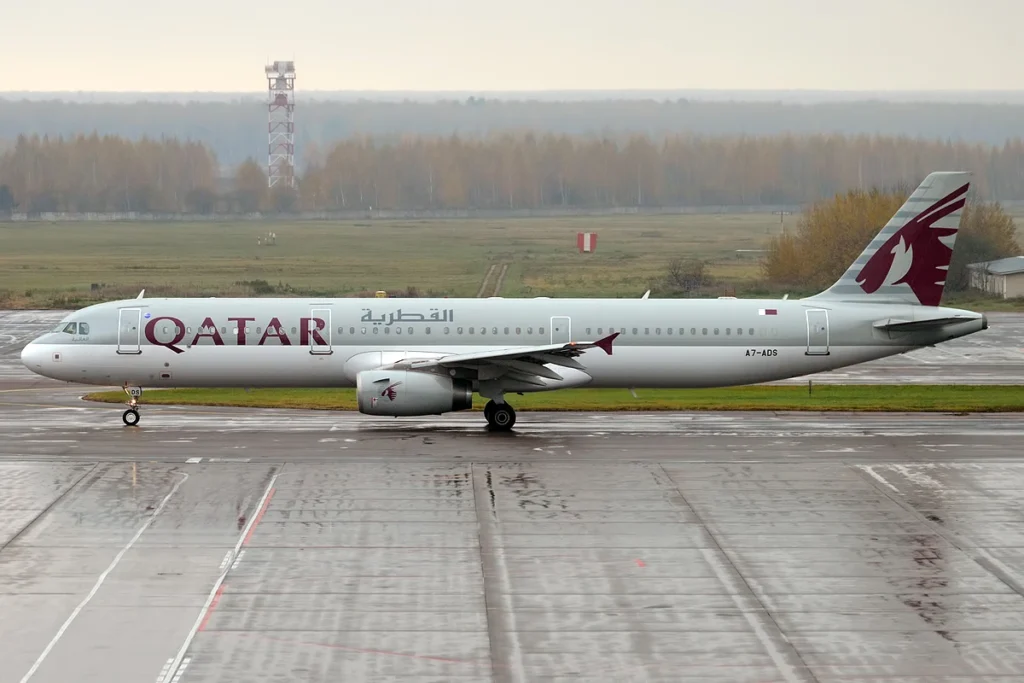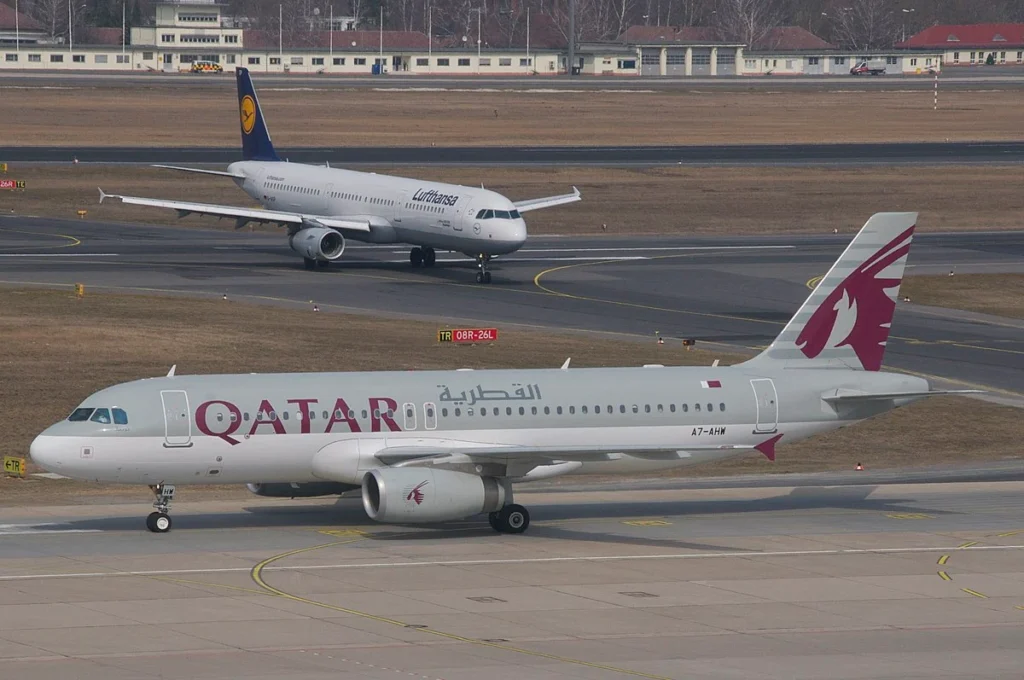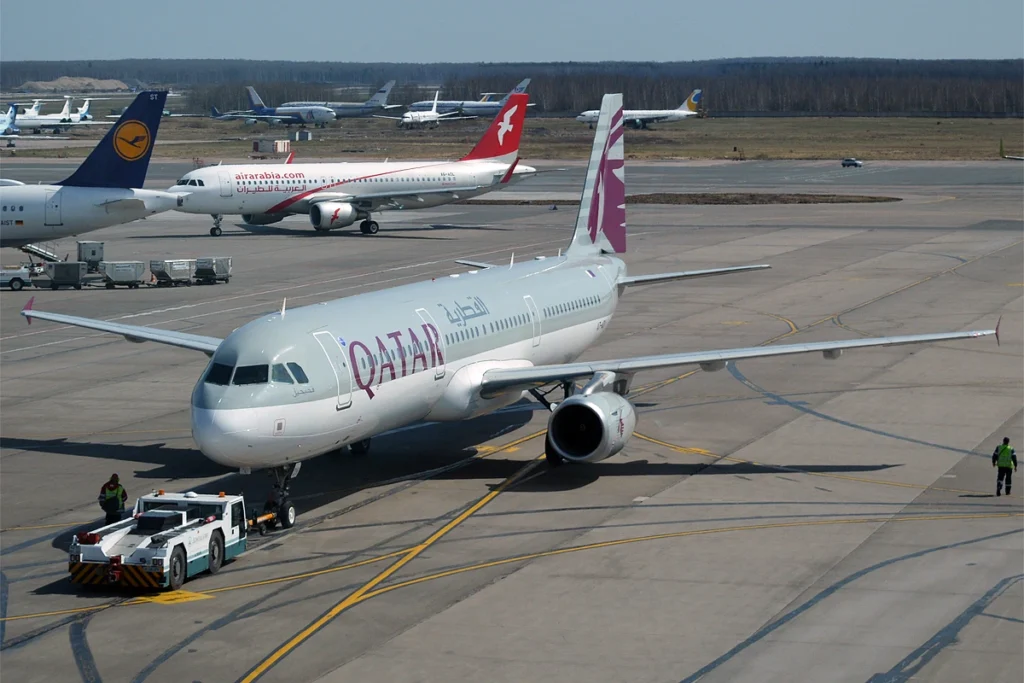
DOHA- Qatar Airways (QR) will introduce all-economy Airbus A321neos in a 236-seat configuration. The airline will begin operations with the mono-configured aircraft in October 2025, serving regional routes from Doha (DOH) to cities such as Madinah (MED), Multan (MUX), Peshawar (PEW), Sharjah (SHJ), Sialkot (SKT), and Tbilisi (TBS).
This layout removes the business cabin entirely, enabling significantly higher passenger density. It mirrors ultra-low-cost carrier setups and reflects a strategic shift toward volume on price-sensitive routes.
 Photo: By Anna Zvereva from Tallinn, Estonia – Qatar Airways, A7-ADS, Airbus A321-231, CC BY-SA 2.0, https://commons.wikimedia.org/w/index.php?curid=53851604
Photo: By Anna Zvereva from Tallinn, Estonia – Qatar Airways, A7-ADS, Airbus A321-231, CC BY-SA 2.0, https://commons.wikimedia.org/w/index.php?curid=53851604Qatar Airways A321neo Fleet
Here’s a table that shows the routes where Qatar is set to operate its high-density Airbus A321neos, and when the operations might start.
| Doha (DOH) – Madinah (MED) | 16 October 2025 |
| Doha (DOH) – Multan (MUX) | 26 October 2025 |
| Doha (DOH) – Peshawar (PEW) | 26 October 2025 |
| Doha (DOH) – Sharjah (SHJ) | 26 October 2025 |
| Doha (DOH) – Sialkot (SKT) | 3 November 2025 |
| Doha (DOH) – Tbilisi (TBS) | 1 January 2026 |
These routes cater to high-volume traffic, particularly migrant workers, family and religious travel, where fare competitiveness outweighs premium seating needs.
 Qatar Airways and Lufthansa; By Aero Icarus from Zürich, Switzerland, Wikimedia Commons
Qatar Airways and Lufthansa; By Aero Icarus from Zürich, Switzerland, Wikimedia CommonsAircraft Configuration
Qatar Airways has 50 A321neo family jets on order, including some A321LR variants for longer missions.
The initial A321neos will be configured in an all-economy layout with 236 seats, significantly denser than typical dual-class arrangements that average around 182 seats (12 business + 170 economy). Here is a table that shows how Middle East Airlines has configured its Airbus A321neo:
| Cedar Class (Business) | 28 Recaro CL5710 recliners, slate grey fabric, 2-2 configuration | 21″ | 50″ | 8″ | 13″ HD touchscreen | Universal AC, USB-A, USB-C sockets |
| Economy | 132 Recaro CL3710 slimline seats, 3-3 configuration | 18″ | 32″ | 4″ | 10″ HD touchscreen | USB-A and USB-C sockets |
Removing the business cabin frees space and lowers the cost per seat. It also enables higher seat counts while possibly compromising legroom and onboard entertainment, which may be reduced or omitted in early aircraft deliveries.
Travelers on these A321neos can expect a tighter legroom (likely similar to low-cost carriers) and a possible lack of seat-back screens.
VisaVerge also advises passengers to download entertainment on personal devices, as in-flight amenities may be limited. Checking the aircraft type when booking is critical for those prioritizing comfort, OMAAT reported.
 Photo: By Anna Zvereva from Tallinn, Estonia – Qatar Airways, A7-ADV, Airbus A321-231, CC BY-SA 2.0, https://commons.wikimedia.org/w/index.php?curid=58720677
Photo: By Anna Zvereva from Tallinn, Estonia – Qatar Airways, A7-ADV, Airbus A321-231, CC BY-SA 2.0, https://commons.wikimedia.org/w/index.php?curid=58720677What’s the Strategy?
Adding high-density A321neos allows Qatar Airways to increase capacity without adding frequencies or aircraft types, optimizing slot-constrained operations.
The airline seems to be benchmarking volume against ultra-low-cost carriers—its cabin density rivals those of Wizz Air (239 seats) and Transavia (232 seats).
This marks a departure from Qatar’s premium positioning, but it aligns with observed demand patterns on specific regional routes. The strategy could evolve: if demand shifts or feedback dictates, Qatar may reintroduce premium cabins later.
Bottom Line
Qatar Airways’ decision underscores a volume-driven regional strategy: deploying high-density, mono-class jets to meet demand while retaining operational efficiency. The long-term success of this configuration will hinge on both load factors and customer acceptance of reduced onboard comfort.
Should these routes sustain high occupancy, Qatar may scale its dense configuration to similar markets. Conversely, underwhelming feedback or lower yields may prompt reconfiguration to reintroduce premium cabins or balance density and comfort.
Stay tuned with us. Further, follow us on social media for the latest updates.
Join us on Telegram Group for the Latest Aviation Updates. Subsequently, follow us on Google News
Qatar Airways Adds More A380 Flights to Most Visited City in the World
The post Qatar Airways to Have All-Economy Seats on This Aircraft appeared first on Aviation A2Z.


















